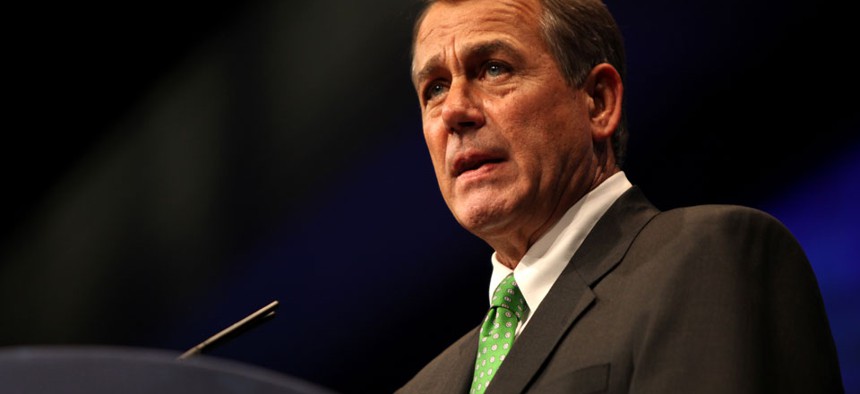
Flickr user gageskidmore
Analysis: Boehner’s Passive-Aggressive Style Heightens Risk of Government Shutdown
The House has nine legislative days left after recess to pass spending bills and reconcile them with the Senate.
Reader Stephen Herbits sent me a striking Robert's quote—not by Chief Justice John Roberts but Henry Robert, who produced one of the most consequential books of the 19th century, Robert’s Rules of Order, which has shaped how countless organizations, not to mention every meaningful legislature, have set up and organized themselves to operate rationally, reasonably, and fairly. In his original tome from the mid-1800s, Robert wrote:
“Where there is radical difference of opinion in an organization, one side must yield. The great lesson for democracies to learn is for the majority to give the minority a full, free opportunity to present their side of the case, and then for the minority, having failed to win a majority, gracefully to submit and to recognize the action as that of the entire organization, and cheerfully to assist in carrying it out, until they can secure its repeal.”
To take an old line, if Robert were alive today, he would be spinning in his grave. To be sure, we are seeing a significant retreat from lunacy in the Senate: The opposition of Republicans John McCain, Tom Coburn, Richard Burr, and now John Cornyn to the tactic of threatening a government shutdown or worse unless the president abandons funding for Obamacare means a solid bipartisan stance to keep the government operating; it most likely will also extend to the debt limit without a similar exercise in blackmail. But the House is a different matter. Reps. Tom Cole of Oklahoma and Peter King of New York, who have condemned the blackmail threat, are both loyalists to Speaker John Boehner, and also pragmatic enough to know that a government shutdown will create chaos in the economy and society and a strong backlash against Republicans in Congress—probably greater than the one we saw in 1995-96 against Newt Gingrich’s House. But Cole and King do not represent the House Republican Conference. What about the speaker?
Almost every veteran Congress watcher likes Boehner; he is a good guy who has evolved in his congressional career from revolutionary bomb thrower to real legislator, and he has gone through a lot of highs and lows before achieving his dream and becoming speaker of the House. But look at where he is now! Boehner is less a leader than the prisoner of his own caucus, unable to pull it in a direction that does not meet the test of his most extreme members (who now number a majority of the majority, or close to it). He cannot count on the support of his leadership team—and when one of them, Eric Cantor, has himself tried to pull the caucus back to some form of sanity, he has failed.
Boehner has used two strategies to stay on top. One is a passive-aggressive approach to agenda management—wait to bring up bills that will not pass muster with the extremist hard-liners until it becomes clear that they all will suffer from inaction; this allows his members to vote against the bills while the Democrats bail them out. That worked three times, on the fiscal cliff, aid to Hurricane Sandy victims, and the Violence Against Women Act. But Boehner has very few get-out-of-jail-free cards to use this way.
The second strategy is designed to mollify his extremist hard-liners. That is, get out in front of them and promote or pursue extremist policies and rhetoric to show he is one of them. Thus, we have the Boehner who said recently, “Obamacare is bad for America.” And, “We are going to do everything we can to make sure it doesn’t happen.” That is the same Boehner who has made sure the House spends more time and attention on dozens of votes to repeal Obamacare than everything else combined. And the Boehner who, after acknowledging many times that allowing the U.S. to default would be catastrophic, now says he will join in demands that President Obama accept draconian budget cuts—in an amount equal to the increase in the debt limit, meaning hundreds of billions piled on top of the sequestration cuts—before permitting an increase in the debt limit. That hard-line stance both makes the extremists feel better and boxes Boehner in when he most needs wiggle room.
Here is the looming problem: The House has nine—count ’em—legislative days in September to complete action on the appropriations bills that make up most of the government we see, and to try to reconcile their bills with the Senate, which has to act on the same 12 bills. The chances of that happening before Oct. 1? Zero. But even if the House and Senate passed all the appropriations bills, chances are close to zero that they could compromise on them—the gulf between the chambers is greater than ever, since the Boehner-“led” House tripled down on the tough sequester cuts for domestic programs (it cut deeper to meet the Ryan plan to balance the budget in 10 years, and it cut even deeper again to shift more money to defense than the sequester provides).
So, even if Boehner can bypass hard-liners’ demands that the administration capitulate on Obamacare to keep the government running, he will have to find a way to spend far more on domestic programs than his party wants via a compromised continuing resolution, or all or part of the government will shut down. More than likely, we will see a short-term extension on Oct. 1, for two weeks or a month. But by Nov. 1, we will have a full-scale confrontation—and one that may coincide with the debt ceiling being reached.
By encouraging the extremists through his rhetoric, and by not looking to compromise spending at all in the House process, Boehner has bought some time and averted some criticism and any chance of a revolt. But that also means that if he endorses a compromise that will fund the Affordable Care Act, move spending levels back at least to the sequester numbers, and extend the debt limit without preconditions, a sizable share of his caucus will go ballistic. Can he do that before we face a shutdown for days, weeks, or months? Can he do it before we actually breach the debt ceiling and suffer the consequences of the destruction of American economic integrity? Will the passive-aggressive approach work this time? I don’t have the answers. But I can say I am not sanguine that we will survive the fall without a major upheaval, in our economy and in Congress.
(Image via Flickr user gageskidmore)







